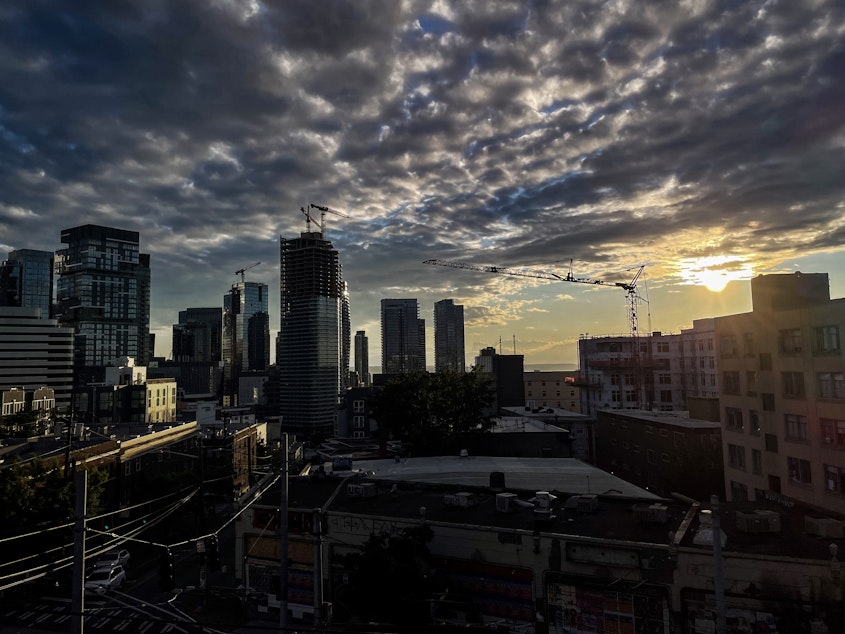Here comes the sun ... at 7 p.m. in Seattle!

What could be better than this week's sunny conditions around Seattle? Try sunlight that sticks around until 6:04 p.m.
That's when the sun will set on Thursday, March 7, signaling the beginning of the end of the Big Dark. But it gets better! Come next week, the sun will stick around until after 7 p.m.
RELATED: Permanent Daylight Saving Time is bad for your health, says UW expert
That's because daylight saving time begins Sunday, March 10, at 2 a.m.
The lasting evening light comes with a tradeoff. When daylight saving time kicks in Sunday, we'll get more light in the evenings and darker mornings until we turn the clocks back again in November.
Sponsored
So, as you prepare to reset any clocks that cannot do it themselves — because isn't the real offense watching the clock on your smartphone to make sure it's in sync with your microwave — here are a few things to keep in mind.
Daylight saving time is bad, mkay?
Extra daylight time in the evening may be nice (for some people), but it's not great for our health.
"First off, it misaligns our body clock with the sun clock. When that gets misaligned, our bodies don't function optimally and problems arise," said Dr. Nate Watson, a professor of neurology at the University of Washington and the co-director of UW Medicine's Sleep Center.
Sponsored
And because many people have to get in the morning, for work or school, Watson said later sunsets mean less sleep, which is associated with various health consequences, like "cardiovascular disease, diabetes, poor mental health, and other negative aspects."
Instead, Watson has argued for permanent standard time.
"We are creatures that are driven by the rising and the setting of the sun," he told KUOW back in March 2022. "Going into permanent standard time is really the more natural way for our bodies to align with the sun clock. Let's take the natural path to not changing our clocks back and forth. Let's go to permanent standard time."
About that...
Sponsored
Permanent standard time left in the dark
Washington state lawmakers did consider moving to permanent standard time during the current legislative session.
State Sen. Mike Padden (R-Spokane Valley) introduced Senate Bill 5795, which would have eliminate the twice-yearly ritual of changing clocks and kept Washington state in standard time.
RELATED: Should Washington stay in standard time? These lawmakers say 'yes'
Padden pointed to the negative health effects of daylight saving time, as Watson mentioned above, as well as increased traffic accidents, spikes in crime, agricultural disruptions, and negative effects on economic growth.
Sponsored
The twice-yearly time change is also, apparently, quite a pain to "the people that operate the sundials," as Padden jokingly testified in the Senate — at least, I think it was a joke.
While Padden actually preferred daylight saving time, he said he'd rather end the pesky time changes this way than wait for Congress to act on a previous bid by the state to move to permanent daylight saving time — more about that in a minute.
If that sounds reasonable to you, I'm sorry to burst your bubble.
In January, the bill was sent to the Senate Committee on State Government and Elections. It never made it out of committee. The bill did not receive a vote this session. So, for now, Washington will not be switching to permanent standard time. Sorry, early birds.
Sponsored
Why are we still talking about this?
Much like the changing of the clocks, this conversation comes around at least twice a year, every year. State and federal officials have tried to move the conversation along.
Gov. Jay Inslee signed a bill in 2019 that sought to put the state on permanent daylight saving time. That requires approval from Congress, however. Approval that has not been given since.
It seemed to be making moves in 2022, when the U.S. Senate unanimously passed the Sunshine Protection Act to switch the entire country to permanent daylight saving time. The Act didn't get taken up in the U.S. House, though.
RELATED: Six things to know about the political debate around daylight saving time
Lawmakers in the House and Senate reintroduced the Sunshine Protection Act in March 2023. Alas, the Act has stalled yet again.




